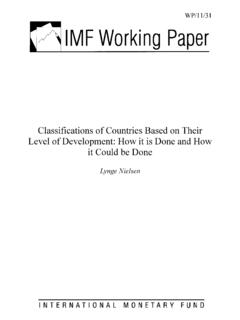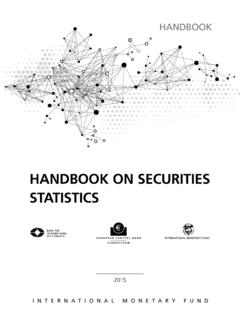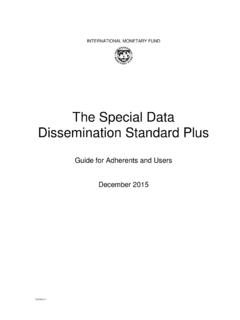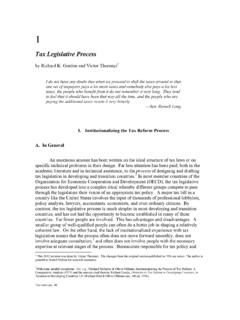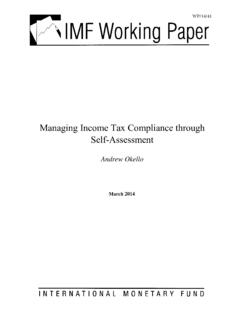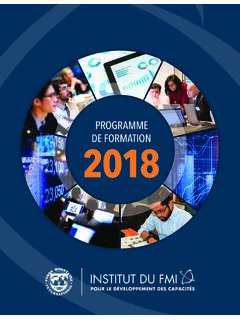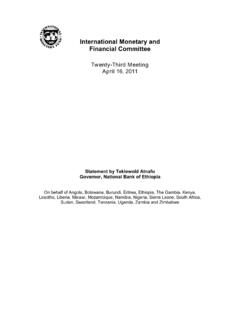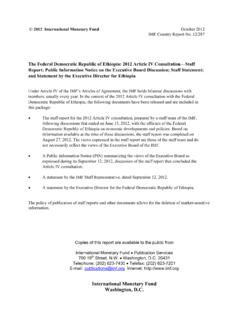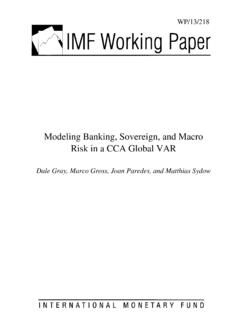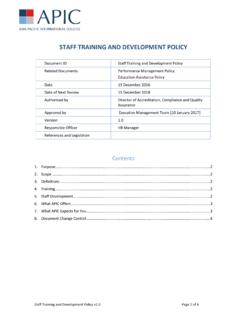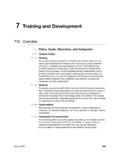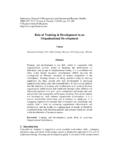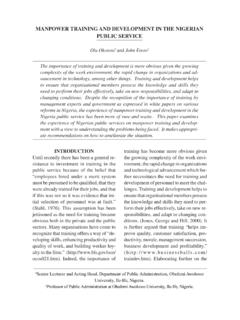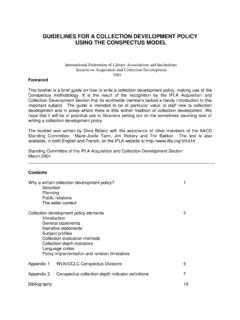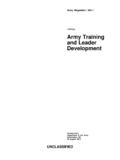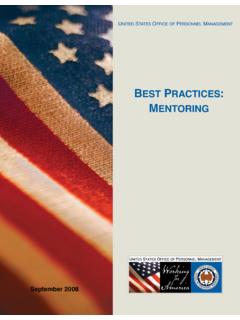Transcription of IMF Institute for Capacity Development | 2018 …
1 2018 training CATALOGWe have not only revamped the content of our courses but have been working to deliver this content more flexibly, to enhance the impact of our training and meet the ever-growing demand from our membership. WE RELY ON THREE DIFFERENT MODES OF DELIVERY TO ACHIEVE THESE OBJECTIVES face-to-face, online, and customized training , delivered through a growing network of regional training centers and programs, will continue to be the center of our work. In addition to providing easy access to courses, it also promotes peer-to-peer learning and allows for greater focus on region-specific issues. I am very pleased to announce that the South Asia Regional training and Technical Assistance Center (SARTTAC), our first fully-integrated Capacity Development center to better serve our members in South Asia, began operations in a complement to our face-to-face training , we will continue to offer MASSIVE OPEN ONLINE COURSES (MOOCs) on the edX platform.
2 Aimed at broadening the reach of our Capacity Development using modern technologies, these courses are available free to all government officials and the public. We aim to expand our online program by adding new courses and course offerings in languages other than English. In 2017, we offered our first course in also deliver CUSTOMIZED training programs anchored by our curriculum and tailored to country circumstances and specific institutional needs. The modular nature of our new curriculum allows us to customize the content more easily to meet specific training needs in institutions and countries in topics ranging from Financial Programming and Policies and Macroeconomic Diagnostics to more technical Model-based Monetary Policy Analysis and Forecasting and Fiscal Policy Analysis with DSGE Models.
3 Customized training often involves working with specific groups of people (perhaps a cohort or the staff of a particular unit) at regular intervals to embed skills or improve an institution s policy making year, the IMF Institute for Capacity Development rolled out its redesigned external training curriculum to meet evolving training needs of our membership by offering clearly sequenced courses with hands-on policy analysis focus and well-defined learning am happy to report that the feedback received so far has been very positive, and we will seek to ensure that our courses continue to adapt to meet the needs of our membership and are integrated with the Fund s surveillance and lending S MESSAGEI am pleased to note that the IMF has adopted a Results Based Management framework for all Capacity building activities.
4 And we have rolled out a new Common Evaluation Framework to strengthen and improve the consistency and comparability of our evaluation work. As part of this framework, ICD has specified learning objectives for every course in our curriculum, which you will find in our catalog. We will continue to use end-of-course surveys and pre- and post-course tests to assess progress on these objectives and participants learning am also happy to announce that we have updated the online version of our catalog to improve user experience and provide additional information about our new curriculum, topics and courses, locations, and schedules. I encourage you to visit this revamped version of our online catalog at Also, I will urge you to follow us on Facebook and Twitter for the latest information on the IMF s Capacity Development catalog of courses that we plan to offer in 2018 is a result of a team effort which involves not only the Institute and other IMF departments but also strong partnerships with many multilateral institutions and bilateral donors.
5 These partnerships allow us to meet the ever-growing demand for our training me take this opportunity to express our deep appreciation to the member countries and institutions that provide financial support to the IMF s Capacity Development efforts, including technical assistance and the Institute s training Coorey Director, Institute for Capacity Development International Monetary AND REGIONAL training CENTERS AND PROGRAMS ..7 fHQ: Headquarters fIET: Internal Economics training fOnline LearningRegional training Centers ..10 fATI: Africa training Institute fCICDC: China-IMF Capacity Development Center fCEF: The IMF Middle East Center for Economics and Finance fJVI: Joint Vienna Institute fSARTTAC: The South Asia Regional training and Technical Assistance Center fSTI: IMF Singapore Regional training InstituteRegional training fBTC: The Joint Regional training Center for Latin America in Brazil fGTP: Georgia training Program fOT: Other TrainingProgression DESCRIPTIONS.
6 15 fFinancial Sector Policies ..16 fFiscal Policy ..19 fGeneral Macroeconomic Analysis ..21 fLegal fMacroeconomic fMonetary, Exchange Rate, and Capital Accounts fMonetary and Financial Sector ..38 fSafeguards Assessments ..42 fSpecialized Courses ..43 fSpecialized Fiscal GUIDELINES AND TOPICS ..50 Contents training Catalog 2018 5 training Catalog 2018 5 FOCUSEDHIGH QUALITYINTEGRATEDLENDINGSURVEILLANCECAPA CITYDEVELOPMENTE nhances absorption of technical assistance and creates new demand through exposure to global practicesReveals training needs of government officialsDeepens policy dialogue and facilitates sharing of policy experiencesIdentify training needs and prioritiesIdentify technical assistance needs and priorities and enhance implementation through regular follow-upInforms policy advice.
7 Anchoring it in realities on the ground training TECHNICAL ASSISTANCEIMF Surveillance and Lending OperationsTraining Is Integrated with IMF s Core Activities training Catalog 2018 5 training Catalog 2018 5 1% Journalists/Media Professionals 1% Engineers 2% Academics 3% Economists/Analysts 9% Researchers 14% Students 20% Others 50% Government OfficialsNUMBER OF PARTICIPANTSBY OCCUPATION(November 2013 June 2017)INTRODUCTIONC apacity Development is a core mandate of the International Monetary Fund (IMF). The IMF Institute for Capacity Development (ICD) organizes the training courses described here and delivers much of the training itself. Together with the regional training centers and programs, it also administers courses that other IMF departments deliver.
8 The curriculum offers training on a wide range of topics on which the IMF has expertise, particularly specialized courses by its Finance, Fiscal Affairs, Legal, Monetary and Capital Markets, and Statistics Departments. Each year courses are offered a number of times at different venues throughout the ICD regularly adapts its courses and creates new ones as the needs of officials from IMF member countries evolve and to keep abreast of what is happening at the frontier of economic analysis. The expansion of regional training centers and programs has greatly facilitated this effort and made it possible to expand Institute training Capacity . The ICD can also customize training to a member country s unique circumstances and specific institutional online learning program complements ICD face-to-face training and makes it more accessible to government officials; it has also expanded the reach of IMF training to nongovernment participants, as the figure makes clear.
9 training Catalog 2018 76 IMF Capacity DevelopmentUSER GUIDEThis catalog summarizes the types of training the IMF offers to member country officials at its headquarters (HQ) in Washington, DC, and its regional training centers. It also describes each training venue and gives information on administrative arrangements for catalog supplements, but does not replace, catalogs issued by the regional training centers. ICD course schedules are published online at as they are scheduled and whenever there are changes and additions. fHEADQUARTERS training AND REGIONAL training CENTERS AND PROGRAMS: This section describes the ICD s principal training locations: IMF HQ and the regional training centers and programs. For each location, it lists countries eligible to participate, describes how to access the center s website and apply for courses (where relevant), and provides contact information.
10 For some courses interpretation is available in a second language, which is indicated in the online course schedules. Fluency in the language of instruction or a language in which interpretation is provided is a prerequisite for all courses. fPROGRESSION TABLE: This section provides an illustrative diagram of different training paths that can be followed with courses offered by the ICD. fCOURSE DESCRIPTIONS: This section describes the courses planned, arranged by topic. In addition to spelling out course objectives, contents, and structure, each course description identifies the target audience and any prerequisite qualifica-tions for those attending. fSELECTION GUIDELINES AND SPONSORSHIP: This section provides information on the eligibility criteria and selection process for admission.
